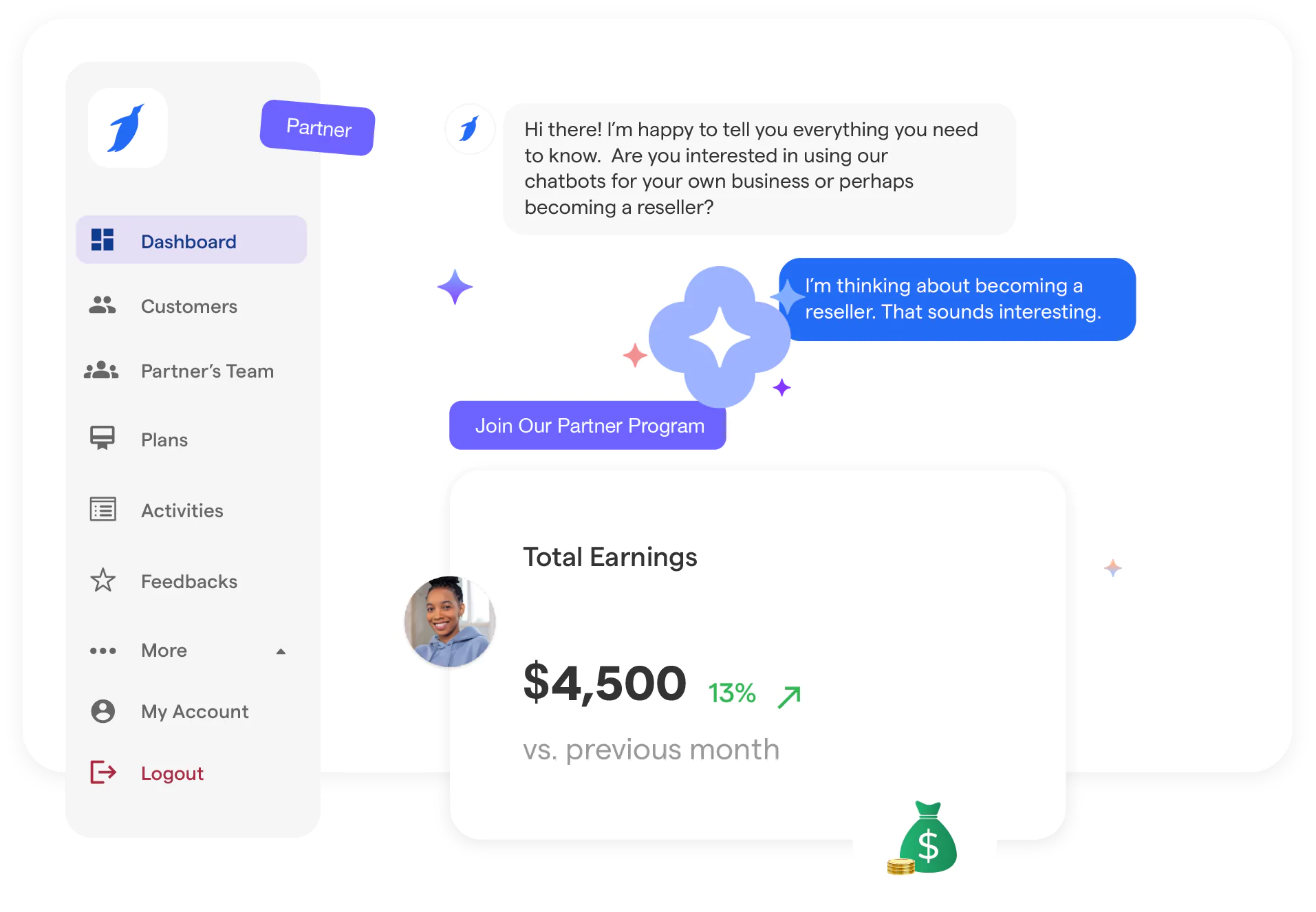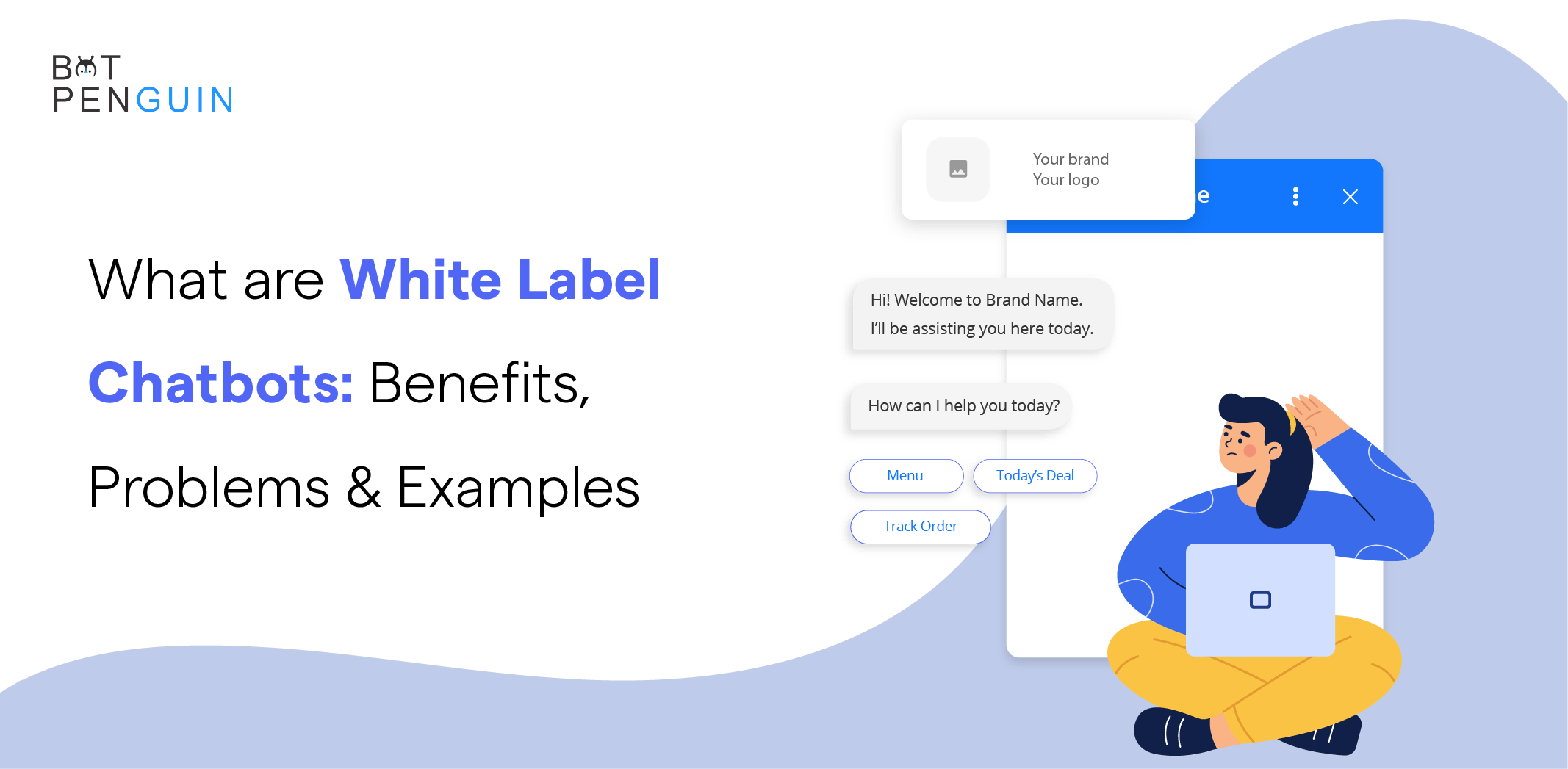Introduction
Most AI tools just save you time. AI agents can make you money.
Instead of using them to cut costs, smart founders are turning AI agents into the product. Cold outreach, onboarding, support, research—what once took teams now runs on autopilot.
This isn’t about internal automation. It’s about real businesses built on AI agents.
In this guide, you'll find 10 high-demand AI agent business ideas.
Each one is designed to solve a real problem, work for real clients, and scale fast—whether you're a freelancer, solo founder, or startup.
What are AI Agents?
AI agents are autonomous systems powered by AI models—usually large language models (LLMs)—that can reason, decide, and act without constant human guidance.
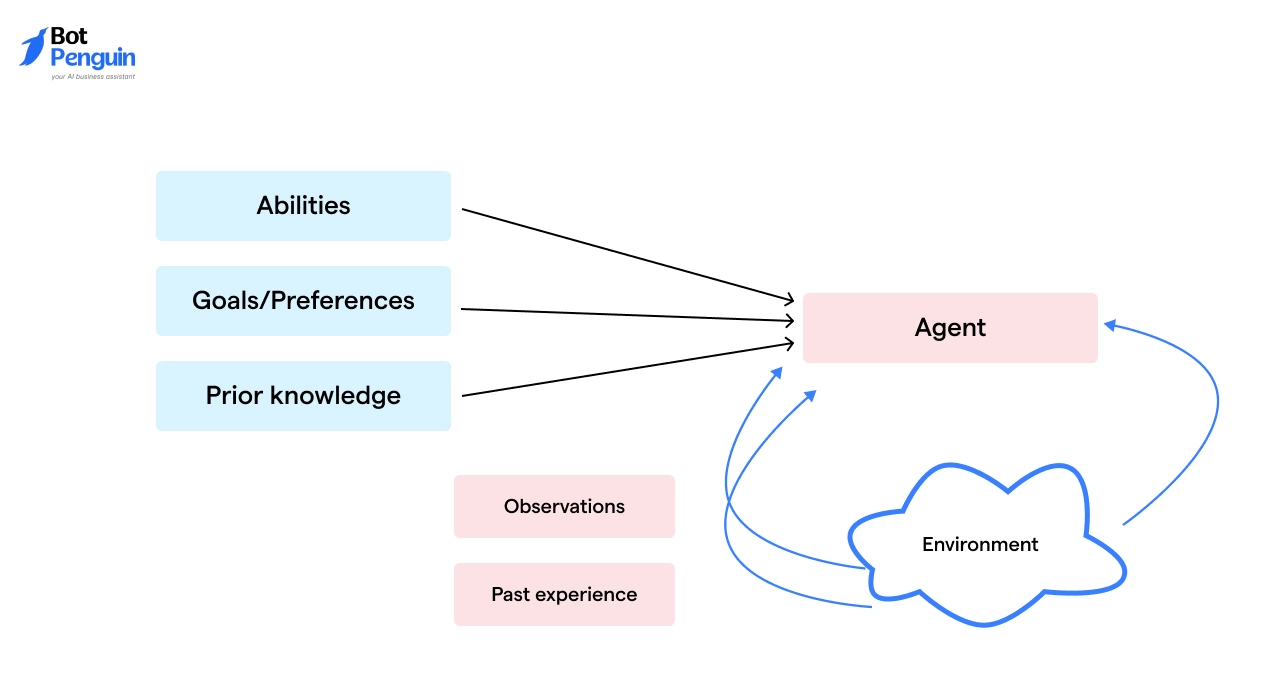
They work by combining three core abilities:
- Perception: Reading input like text, forms, emails, or APIs
- Reasoning: Figuring out what needs to be done based on goals or prompts
- Action: Executing tasks using tools, apps, or external systems
For example, an AI agent trained for customer support could read a user query, search for the answer in documentation, draft a personalized response, and send it via email—completing the full loop automatically.
They often integrate with APIs, CRMs, email clients, calendars, and file systems to decide what needs doing, and take action.
This shift from "thinking" to "doing" is what makes AI agent business ideas such a powerful opportunity.
Why They Matter
AI agents don’t just automate—they unlock leverage.
They take on tasks like responding to leads, onboarding clients, or solving support tickets, without needing to be told what to do at every step. That makes them valuable not only for internal use, but as products you can build and sell.
Here’s why they matter in business:
✅ Free up hours by handling repetitive workflows
✅ Increase team productivity without hiring
✅ Work around the clock with no drop in quality
✅ Offer scalable value to clients as standalone solutions
But not all use cases are created equal. The best results come when the right agent fits the right opportunity.
How to Choose the Right AI Agent Business Idea for You
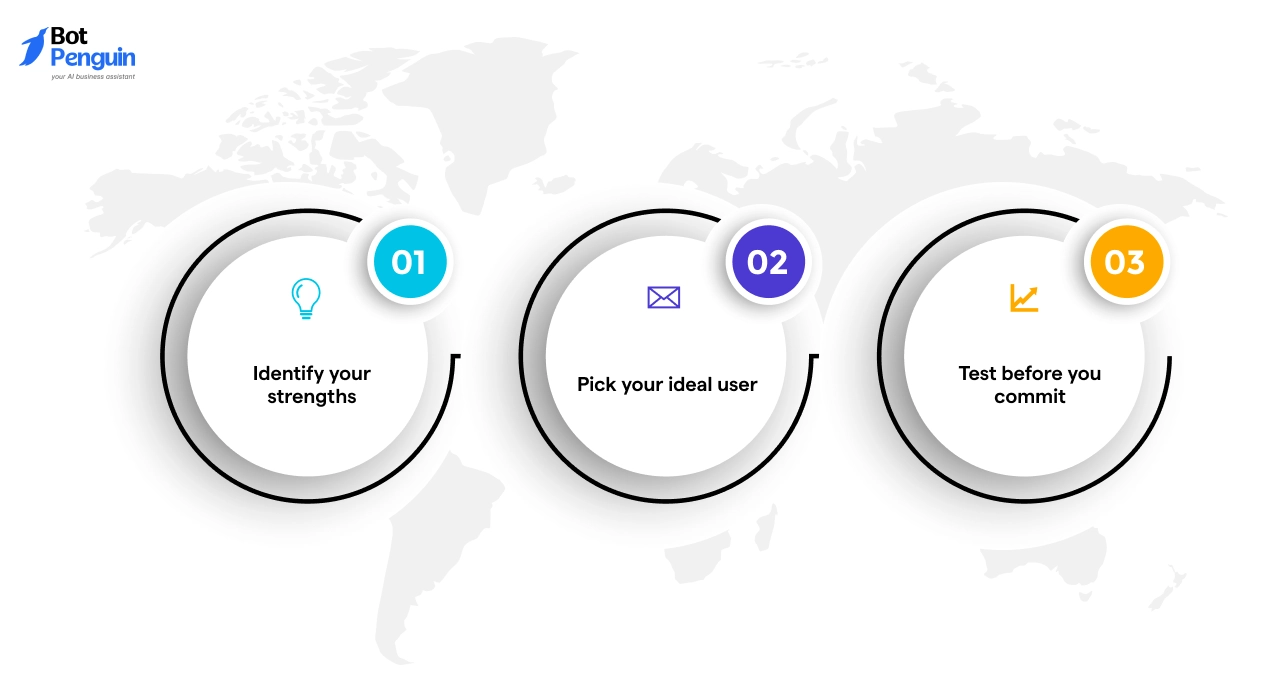
Not every idea will suit your goals, and that’s a good thing.
The best AI agent business ideas aren’t just innovative. They’re a match for your strengths, your resources, and the type of user you want to serve.
Here's how to choose wisely before building.
Identify your strengths
Start with what you already know how to do.
If you have a technical background or feel comfortable working with APIs, lean toward agents that require workflow integrations or prompt logic — like lead qualification or CRM-syncing sales agents.
On the other hand, if you’re non-technical, you can still build strong tools using platforms like Zapier, Make, or ChatGPT.
These are ideal for building support, scheduling, or content agents with low lift. If your expertise is in branding, marketing, or design, you might even wrap these agents in a compelling frontend and sell them as niche solutions.
Pick your ideal user
Understanding who your tool helps is everything.
Solopreneurs often look for AI agents that save time and reduce daily workload. Agencies, on the other hand, prioritize tools that drive revenue or reduce repetitive tasks.
Enterprise clients usually need more control and integration flexibility.
So instead of building what sounds exciting, choose an idea based on what your target user will pay for — and why.
Test before you commit
You don’t need to build something complex to know it works.
Build a simple version using tools you know, then share it with a few users who reflect your target market. If they get it quickly and see value right away, you’re on the right track.
Choosing the right agent isn’t about scale yet. It’s about starting small with high leverage.
Once that’s clear, the AI agent ideas for business in the next section will offer a smarter shortlist to pick from.
10 Profitable AI Agent Business Ideas
AI agents aren’t just helpful—they’re business-ready.
With low setup costs and rising demand, they offer real opportunities for solopreneurs and startups to build sellable products.
In this section, you’ll find practical business ideas that are grouped by use case. Each one includes how it works, what tools are needed, and ways to monetize it.
If you're exploring AI agent business ideas that align with your skills or goals, this list is a strong place to start.
1. AI Order Query Solver
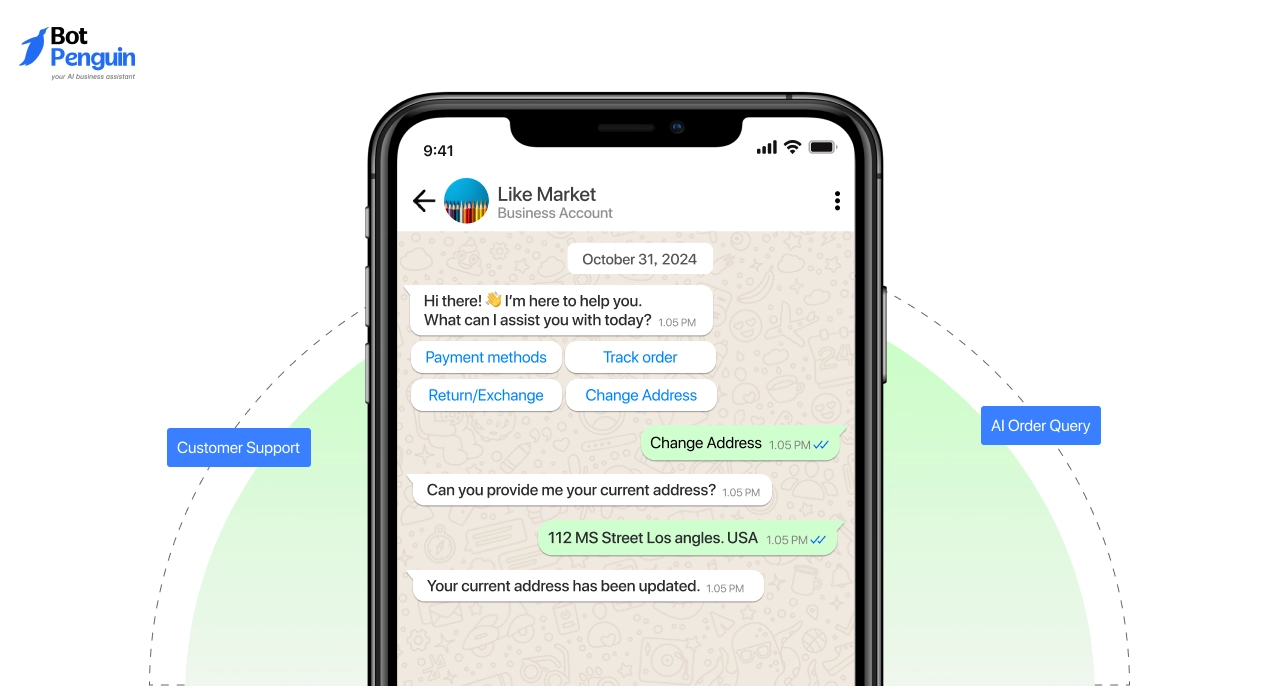
For small to mid-size e-commerce businesses, customer support often gets buried under repetitive queries—“Where’s my order?” “How do I return this?” “When will I get my refund?”
This AI agent takes over exactly that load.
It connects with platforms like Shopify or WooCommerce and talks directly to backend systems.
For example, when a customer asks about an order, the agent checks the database, pulls the latest update, and responds via email or chat. It can also log each interaction into tools like Google Sheets or a CRM, keeping things organized without needing human input.
This kind of support agent solves a huge operational problem.
These simple, repetitive queries make up most of a support team’s daily work. Replacing that with automation isn’t just helpful—it’s necessary for scaling.
Once up and running, the agent can handle up to 60% of incoming queries. That’s a massive time saver for any brand looking to streamline operations without losing touch with customers.
It’s a strong business idea with flexible pricing.
You can charge per response, per customer, or offer it as a monthly SaaS product.
Setup involves moderate effort, especially if integrations and logic flows are reusable across clients.
But once live, this tool delivers 5x or more in saved labor costs, making it a high-ROI solution for e-commerce founders.
2. AI Upsell & Retention Agent
Direct-to-consumer brands and small online stores often miss one big opportunity—getting more out of every customer.
This AI agent helps solve that by automating upsells, cross-sells, and retention workflows right after purchase. Once a customer checks out, the agent jumps in.
It analyzes the buyer’s cart, order history, or browsing behavior, and then suggests a tailored offer—maybe a bundle, a related product, or a timed discount. It can deliver these nudges through chat, email, or SMS, and logs the entire interaction into your CRM for future targeting.
The best part? It doesn’t just stop after one suggestion.
This AI can also follow up, track who redeemed which offers, and refine its messaging over time. For stores that don’t already have deep personalization, this offers an instant upgrade with no manual work.
The demand is strong. Most small stores don’t have the bandwidth or tools to do this kind of targeting well, let alone automate it.
This makes for one of the stronger AI agent ideas for business today.
You can offer this as a SaaS product with flat pricing, or go usage-based for higher-value clients.
The setup cost is moderate, but the value returned is hard to ignore.
On average, brands can see a 15–30% lift in customer lifetime value. And that’s before factoring in the saved time and effort on email or chat-based upselling.
3. AI Sales Outreach & Qualification Agent
For B2B companies that rely on outbound leads, sales prospecting can be time-consuming and repetitive.
This AI agent turns that entire workflow into a hands-free engine.
It starts by pulling lead data from sources like LinkedIn, Apollo, or a CRM. Then, it generates personalized cold emails or messages using prompts, segmentation, and tone matching.
The agent doesn’t just stop there—it automatically sends follow-ups at the right time, evaluates replies for intent, and marks hot leads directly into the CRM.
This means no more manual outreach, chasing replies, or losing leads in spreadsheets. It essentially acts as your virtual SDR (Sales Development Rep), working 24/7.
The demand is massive.
Outbound sales teams are under constant pressure to hit targets, but often lack the bandwidth or headcount. This solution can reduce a human SDR’s workload by up to 70%, while keeping quality and consistency high.
From a monetization angle, this agent fits well into a subscription model—either per seat or based on the number of leads processed monthly. Many sales teams are willing to pay for faster, smarter lead gen.
Setup costs are moderate. You'll need reliable APIs for email and CRM integration, but the return is huge.
Businesses can experience 5x faster lead generation and drastically shorten their sales cycles—making this one of the most scalable and high-impact AI agent business ideas available right now.
4. AI Content Calendar & Brief Builder for Agencies
For content-driven teams, strategy is often the biggest time sink.
This AI agent removes the bottleneck by turning client goals into a ready-to-execute plan, without creative burnout.
Once you input business goals, target keywords, and audience segments, the agent generates topic clusters with SEO intent in mind. It maps out a content calendar—weekly, monthly, or quarterly—and builds detailed briefs with outlines, CTAs, tone guidelines, and internal links.
It can even sync with project management tools like Notion, Trello, or Asana to assign tasks automatically. This solves a real pain point.
Agencies and in-house teams spend countless hours aligning strategy, briefing writers, and chasing consistency. With this agent, that entire workflow gets compressed into minutes.
Strategy creation becomes faster and more structured, not dependent on one strategist.
As a business, the monetization options are flexible.
You can offer it as a SaaS product with a monthly subscription or use a credits-based model for each brief or calendar generated. Both fit well into how agencies buy software.
The build is low to moderate in cost. Most of the logic revolves around prompt chaining, keyword analysis APIs, and integration hooks with productivity tools.
ROI is strong. Agencies can cut down planning time by 3–6x while scaling quality output.
It’s one of those AI agent business ideas that blends creativity with efficiency, perfect for recurring use across clients.
5. AI Agency Client Onboarding Agent
Getting a new client should feel exciting, not chaotic.
But for many agencies, onboarding is a bottleneck that delays delivery and hurts client trust. This AI agent solves that friction point.
The agent initiates onboarding the moment a contract is signed. It asks the client all the right questions through a conversational interface—brand assets, access credentials, goals, target audiences—and collects structured inputs without back-and-forth emails.
Next, it turns responses into internal SOPs and auto-assigns tasks inside agency tools like ClickUp, Notion, or Trello. It can send nudges and reminders when inputs are delayed or incomplete, keeping projects on track from day one.
This is where AI agent business ideas shine: removing repetitive admin work that teams shouldn’t be doing manually in the first place.
Agencies lose time and momentum when the kickoff is slow. This AI onboarding agent ensures nothing slips through the cracks. Clients feel guided. Teams feel organized. Projects start faster.
Monetization is straightforward—either charge per onboarded client or offer access via an annual license to agencies. Both models align well with agency workflows and margins.
The cost to build is moderate, involving secure data handling, dynamic forms, and API integrations with common task tools.
The payoff is huge. Agencies can see a 10x gain in time saved per project start, with fewer delays and more retained clients. It's a high-ROI solution for a universally shared problem across service businesses.
6. AI Proposal Builder & Contract Closer
In B2B services, speed and precision often decide who wins the deal.
But crafting proposals and contracts manually? That’s where time leaks happen—and deals stall. This AI agent eliminates the drag.
It starts by collecting key client details—scope, pricing model, timeline, deliverables—via a quick intake form or CRM integration. Then, it generates a customized proposal instantly, adjusting tone, layout, and content based on industry, service type, or client persona.
Pricing logic can be built in, enabling dynamic fee calculation. Once approved internally, it pushes the proposal to contract generation, adding terms, eSign links, and tracking engagement from the recipient.
This agent doesn't just write documents—it accelerates the sales cycle.
For consultants and service providers who rely on timely proposals, the impact is immediate. No more copy-pasting. No more bottlenecks waiting on legal or admin teams. Just polished, on-brand proposals in minutes.
You can monetize it with a pay-per-document model for freelancers or a monthly SaaS plan for larger firms generating proposals at scale.
The cost to build is medium—requiring templates, natural language tuning, and integration with eSign platforms like DocuSign or PandaDoc.
But the return?
Expect a 3–5x improvement in turnaround time and deal close rates. This AI agent turns one of the most tedious sales steps into one of the most efficient—giving you a clear competitive edge.
7. AI SaaS User Onboarding & Success Agent
Getting users to sign up is one thing. Getting them to stay? That’s where most SaaS products struggle.
A clunky onboarding experience is one of the biggest churn triggers, and this AI agent fixes exactly that.
Built for SaaS companies with complex dashboards or multi-step setups, this agent guides users step-by-step from the moment they log in.
It explains features in context, nudges users toward activation milestones, and triggers real-time tooltips or alerts based on user actions.
It can track progress, notify success teams if users encounter issues, and even offer intelligent help suggestions when users hesitate at a specific feature. The experience feels personalized—without adding more human effort.
Why does it work? Because successful onboarding means higher product adoption and lower churn. Instead of a one-size-fits-all tutorial, users get an adaptive, hands-on walkthrough tailored to their pace.
You can monetize this with a flat monthly fee for small SaaS tools or per-user pricing for larger platforms that serve thousands.
The cost to build is moderate—you’ll need behavior tracking APIs, product tour integrations, and some UX refinement. But the outcome is powerful.
Teams using this AI agent often experience a 20–40% decrease in early churn and a reduction in support tickets.
It transforms onboarding from a passive process to a proactive, intelligent journey that keeps users engaged and encourages them to return.
8. AI Internal IT Support Agent
As mid-size enterprises scale, their internal IT tickets start piling up.
Most of these tickets — think password resets, access requests, and basic troubleshooting — don’t need human intervention. That’s where an AI Internal IT Support Agent fits in.
It’s designed to take over the Tier 1 load and let your human IT team focus on more complex problems.
This AI agent can reset credentials, answer device-related questions, guide users through common fixes, and even escalate unresolved cases — all while logging everything inside your helpdesk tool like Zendesk, Freshservice, or Jira.
It integrates directly with internal systems and tools, automating repetitive workflows end-to-end.
There’s high demand for this kind of support automation because most internal IT teams are overloaded. Employees wait hours, sometimes days, for simple fixes.
By deploying an internal AI support agent, companies can reduce ticket queues and response times drastically — without expanding their IT staff.
Monetization is straightforward. Offer it as a SaaS for internal teams, charging by number of users or tickets resolved.
Cost to build can be moderate to high, depending on integration depth and security requirements.
But the return on investment is strong — with a 4x+ improvement in support efficiency, companies save both time and operational cost.
For teams looking to reduce internal friction and boost employee experience, this kind of AI agent is a no-brainer.
9. AI SOP Extraction & Training Agent
As teams grow or expand into remote/franchise models, they struggle to keep everyone aligned. Processes live in Slack threads, scattered docs, or inside someone’s head.
An AI SOP Extraction & Training Agent helps solve this chaos.
It observes daily workflows, identifies patterns, and automatically generates structured SOPs from them.
Once the processes are documented, the same agent turns them into short training modules. These can include checklists, quiz-based onboarding, and walkthroughs for new hires or cross-functional teams.
It syncs with knowledge bases, LMS tools, or even Google Workspace — ensuring updates are never lost.
There’s strong demand for this solution.
Growing businesses often lose time repeating instructions or correcting inconsistent workflows. Manual SOP creation is also slow and rarely updated.
With an AI agent in place, businesses can automate documentation and training without slowing down.
Monetization works well as a SaaS license for teams or a per SOP pack model. This lets service providers offer it as a standalone product or part of an onboarding package.
Costs are moderate, especially if integrations with Slack, Notion, or HR tools are required.
But the payoff is clear: You get 3–5x gains in training productivity, faster ramp-ups, and fewer mistakes in day-to-day work.
This AI agent not only documents—it builds a learning loop that scales with your team.
10. AI Community Engagement Agent
Running a thriving online community takes time. Brands on platforms like Discord, Slack, or WhatsApp often struggle to keep up.
An AI Community Engagement Agent helps scale community management without burning out your moderators. It can answer FAQs, send reminders, greet new members, and escalate important queries to human admins.
It also tracks engagement — logging response times, active members, and trending questions.
The result?
More consistent communication and fewer missed opportunities to connect with members.
This solution is seeing growing demand as more brands invest in private communities for product support, feedback, or loyalty.
Most teams can't afford to moderate 24/7 — and that's where this agent shines. By stepping in during off-hours or managing basic questions, it keeps the community active and helpful.
Monetization can be set up as a per-user plan or per community license, depending on size.
It's also great for freelancers offering community ops services as a productized package.
Cost is medium, especially when setting up integrations or fine-tuning the tone of voice across platforms.
But the ROI is strong: You’ll see 2x–4x improvements in engagement and retention, along with happier, better-informed members.
This is one of those agentic AI business ideas that turns passive groups into responsive, self-sustaining communities — without adding headcount.
These ideas aren’t just clever—they’re built for real business impact. Whether you want to work solo or scale with a team, each one has clear demand and strong potential.
To move from concept to launch, you’ll need the right stack to bring your agentic AI business ideas to life. So, let’s explore them next.
Tools to Build Your First AI Agent
You don’t need to be a machine learning engineer to launch an AI agent today.
A growing ecosystem of platforms, frameworks, and no-code tools makes it easier than ever to bring your concept to life—whether you're building solo or with a team.
These tools help you turn agentic AI business ideas into working systems, fast.
You can design agents to work autonomously, connect to databases, take real-time actions, and even communicate with users—all without reinventing the wheel.
Here are the most effective tools for building and launching your first AI agent:
White Label AI Agent by BotPenguin
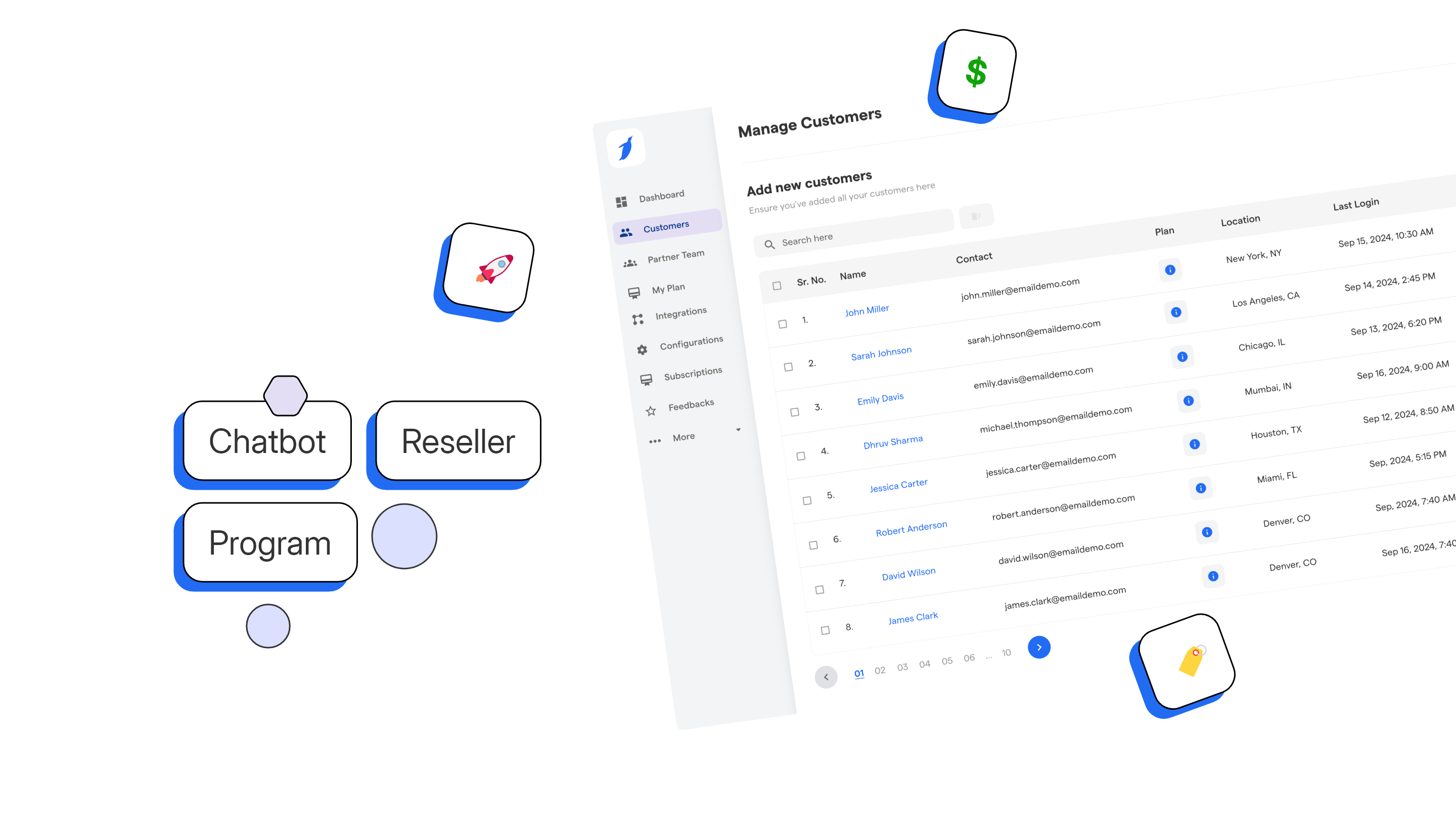
Whitel Label AI Agent is perfect for entrepreneurs and freelancers who want to resell plug-and-play agents to clients—without writing a single line of code.
With built-in integrations, dashboards, and brandable UIs, it’s a solid choice if you're looking to launch solutions like the AI Upsell & Retention Agent or Client Onboarding Agent.
It’s especially useful for DTC consultants or agency owners offering AI tools as services under their own brand.
AutoGPT & CrewAI
These are ideal for building autonomous agents that can run multi-step tasks in a loop.
If you’re working on the AI Sales Outreach & Qualification Agent or Internal IT Support Agent, these tools help manage workflows end-to-end.
They’re best for agents that require continuous logic, follow-ups, or decision branches.
LangChain
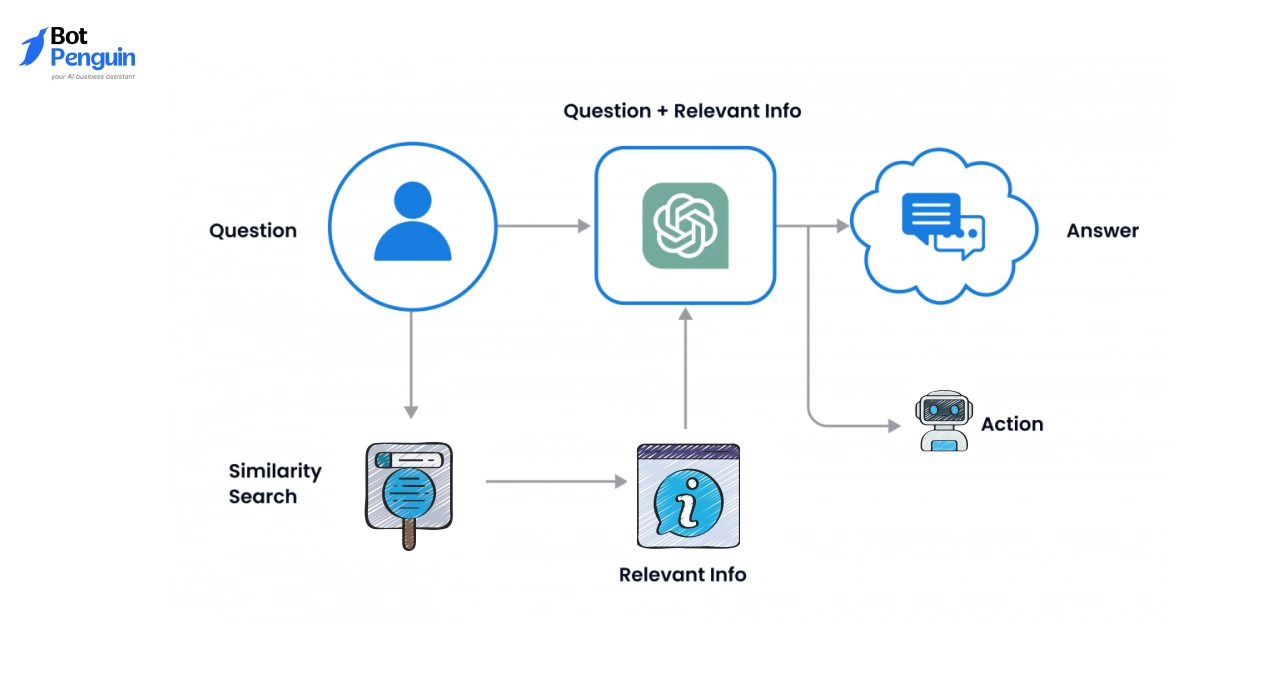
LangChain is great for combining language models with memory, tools, and API calls.
It’s perfect for creating the AI Content Calendar & Brief Builder, where agents need to interact with structured content and external systems. The tool also supports chaining multiple actions for a more intelligent output.
Flowise
Flowise gives you a visual builder to chain AI functions step by step.
If you’re building the AI Proposal Builder & Contract Closer, this makes it easy to define logic, adjust pricing, and generate eSign-ready documents.
Great for creators who prefer working with visual logic instead of raw code.
Zapier + GPT
Zapier + GPT is perfect for fast MVPs or lean automations.
Use it to build agents like the AI Order Query Solver or Community Engagement Agent by combining smart text generation with workflow triggers.
It’s flexible, no-code, and connects with thousands of apps.
Bubble & Webflow (with AI plugins)
These no-code builders help wrap your AI logic into customer-facing websites or portals.
Use them for tools like the AI Client Onboarding Agent or User Success Agent that require an intuitive front-end. Great for delivering branded, polished experiences without heavy development.
Open-source frameworks (e.g., LangGraph, SuperAgent)
These are powerful choices for developers building advanced use cases.
Ideal for complex tools like the AI SOP Extraction & Training Agent, where data flows and access control matter.
They offer flexibility, customizability, and deep integration options for teams with dev resources.
These tools are not just helpful—they’re foundational for launching scalable AI agent ideas for business. Once you’ve picked the right tech stack, your agent isn’t just an idea anymore—it’s a living system.
As you explore and experiment with these tools, it’s just as important to be aware of the common roadblocks that can slow down your momentum.
Key Hurdles in Starting an AI Agent Business Idea
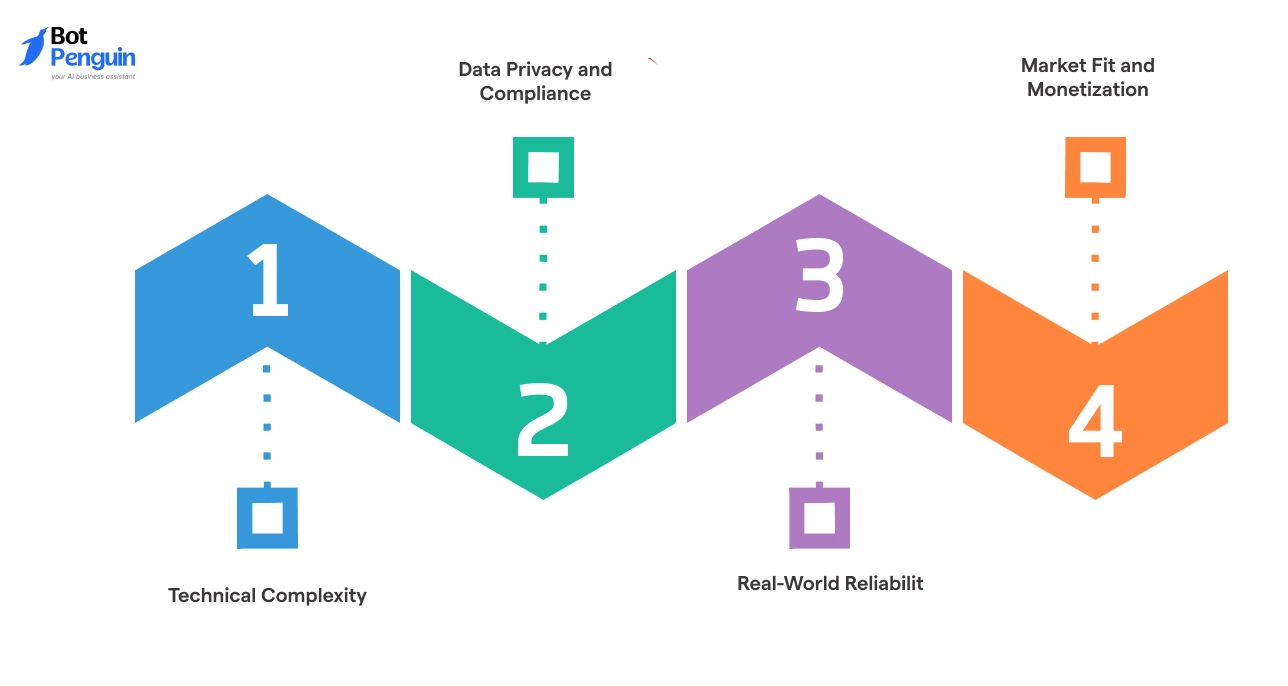
Even with the right tools and a strong business idea, the journey from concept to launch isn't always smooth.
Behind the scenes, building a reliable, useful agent takes more than automation. You’ll need to handle technical decisions, legal boundaries, and market feedback — sometimes all at once.
Many promising AI agent ideas for business fail not because of a lack of ambition, but due to overlooked friction points in the early stages.
Here are four common hurdles to watch for:
Technical Complexity
Not all ideas are no-code friendly.
Some require working with APIs, chaining tools, or integrating business logic into your AI agent’s flow.
For instance, setting up an agent that connects with a CRM, fetches real-time updates, and writes back into it can involve a fair amount of backend orchestration.
If you're non-technical, start with simpler ideas or consider no-code frameworks first.
Data Privacy and Compliance
Handling customer or user data? You’ll need to comply with regulations like GDPR or HIPAA.
This is especially true for agents in industries like healthcare, finance, or legal. Skipping this could mean fines or lost trust.
Always clarify what data your agent touches and whether it’s stored, processed, or transmitted externally.
Real-World Reliability
Even the best AI agents can slip up.
Errors in decision-making, miscommunication, or wrong task execution are common, especially in dynamic real-world scenarios.
To handle this, add safety nets like human review checkpoints or escalation workflows.
You can also use hybrid setups where agents assist but don’t act independently on sensitive tasks. This reduces risk while keeping efficiency high.
Market Fit and Monetization
It’s easy to build something that sounds good on paper but solves nothing real.
Before building out your agent, test the need — even with mockups.
Interview your target audience. If people wouldn’t pay to replace a current task or solve a pain point, it’s worth revisiting your direction.
Overcoming these hurdles doesn't require perfection, just preparation.
Once you understand what to expect, you're far more equipped to build and sell something that lasts.
Conclusion
From solopreneurs to scaling startups, AI agent business ideas offer a lean and powerful path to building automated ventures that deliver real value.
If you’ve followed along this far, you’ve seen how to identify impactful ideas, choose the right tools, and prepare for key execution hurdles. The next move? Start small, test fast, and adapt based on real-world feedback.
To build quickly without overengineering, lightweight and flexible platforms are key. Among the tools discussed, one stands out quietly—BotPenguin.
With its white-label-ready framework and automation-first design, it enables faster go-to-market with less build-time friction. For founders who want both branding flexibility and simplicity under the hood, it’s a solid option worth considering!
After all, the right tool can make the difference between a good idea and a launched product.
Frequently Asked Questions (FAQs)
Which AI agent idea has the fastest time-to-launch?
Customer support agents (like order query solvers) and proposal builders are quickest to deploy.
They often use templated workflows and plug in easily into existing systems, such as CRMs or helpdesks, with minimal setup.
How can I test the demand for an AI agent before building it?
Validate by talking to target users, running a waitlist, or simulating the workflow manually first.
If users show interest or pay for a manual version, it’s a green light for automating the process.
Can I white-label AI agents and resell them to clients?
Yes. Platforms like BotPenguin allow white-labeling, which means you can rebrand and offer them as part of your service or SaaS product, making it ideal for agencies and consultants.
What industries are underserved by AI agents right now?
Franchise operations, healthcare admin, education support, and internal IT workflows still have plenty of inefficiencies.
These areas often rely on human-driven SOPs that AI can streamline significantly.
Can I use multiple tools together to build a more powerful agent?
Absolutely. Many builders integrate well. For example, LangChain, Zapier, and Notion can combine NLP logic, automation, and data storage—letting you build modular agents tailored to real-world workflows.
How do I get my first paying client for an AI agent service?
Offer a pilot to a niche business with clear pain points (e.g., busy e-commerce stores). Show the time or cost savings your agent brings, and turn those results into social proof or case studies.
.webp)
